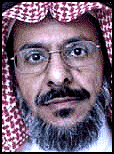
Osama Bin Laden, the world's most wanted man, has connections to a leading Saudi dissident based in London, BBC Radio's Five Live Report has revealed. The programme provides evidence that Saad Al-Fagih, a key figure in the London-based campaign opposed to the Saudi regime, bought a satellite phone that was later used by Osama Bin Laden's al-Qaeda organisation. On 30 July 1998 one of the suicide bombers who blew up the US embassy in Nairobi telephoned the satellite phone number: 00 873 682 505 331. Eight days later the suicide bombers struck in Nairobi and Dar-es-Salaam killing 247 people. The satellite phone was the very same one that had been bought by Saad Al-Fagih in November 1996. Al-Fagih was also involved in a campaign to stop the deportation of another Saudi dissident, Mohammed Al-Masari, from Britain. The campaign to stop Al-Masari's removal by then Conservative Home Secretary Michael Howard finally succeeded in early 1996. 'Same Cause' Al-Masari admits he has talked with and helped Osama Bin Laden in the past and would do so again, telling Five Live Report: "Yes, why not?" The programme asked Al-Masari why he had helped Osama Bin Laden in the past, he said: 'It's the same cause." When asked if he would still help him he replied: "Yeah, if we can help anything, why not?" Labour MP George Galloway was also part of the campaign to keep Al-Masari from being deported to the Caribbean island of Dominica in 1995. The MP - who had a blazing row at Westminster this week after he was called an apologist for Saddam Hussein by a government minister - told the programme: "I have never seen any evidence that either Al-Masari or Al-Fagih were in any way connected to violence and if you have uncovered any I will listen to your programme with interest.' "To attempt a smear by association with that widely supported campaign is disreputable," Mr Galloway said. There is no suggestion that the MP knew about the purchase of the satellite phone. Evidence that Saad Al-Fagih bought the satellite phone later rung by one of the men who blew up the US embassy in Nairobi emerged during a New York trial in 2000, when four al-Qaeda suspects were found guilty of the African embassy bombings. United States attorney Kenneth Karas told a grand jury what was in Exhibit 1623: an order form for an Exact-M 22 Satellite Telephone, dated 1 November 1996: "and for the record, payment portion, Saad Al-Fagih." The order was signed 'S. R. H. Al Fagih.' When asked about the purchase of the satellite phone, Al-Fagih said: "Go and ask anybody else. I do not confirm anything here. "I do not even confirm there have been any details about purchase or not purchase.....I have no comment on this." He told the programme: "Everybody knows that I am totally committed to peaceful agenda." In 1997 the Select Committee on Standards and Privileges investigated a complaint that George Galloway had not declared an interest when speaking on Saudi Arabia the year before. MPs threw out the complaint but looked more closely into the question of Galloway acting as a financial intermediary. Mr Galloway was paid £5,000 in cash by Al-Fagih in late 1995 to early 1996 to repay costs incurred on behalf of others during the campaign to prevent Al-Masari's deportation. He was also given £1800 in cash by Al-Fagih to pass on to academics to help with the same campaign. Mr Galloway has never identified the academics. Full record In the parliamentary committee's concluding report they found that: 'It is unacceptable for any member to be involved in recycling cash between third parties. "It is also highly undesirable for any member to act on behalf of any organisation where no full record is kept of all financial transactions with which the member is associated. "It is bound to be susceptible to misinterpretation and risks bringing the house into disrepute. We are particularly concerned that Mr Galloway's actions were on behalf of an overseas interest.'

No comments:
Post a Comment